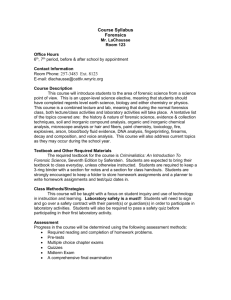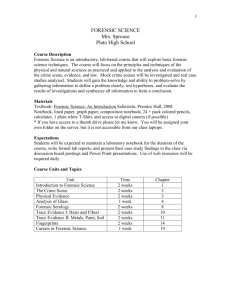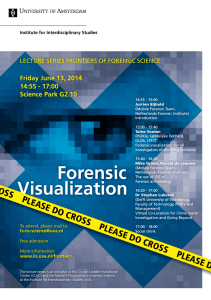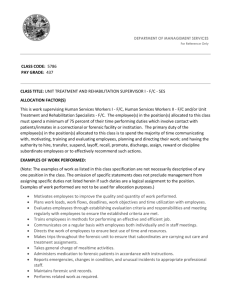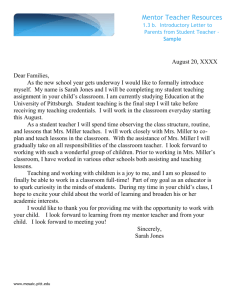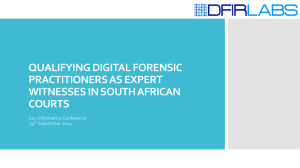South Forsyth High School Forensic Science Course Syllabus
advertisement
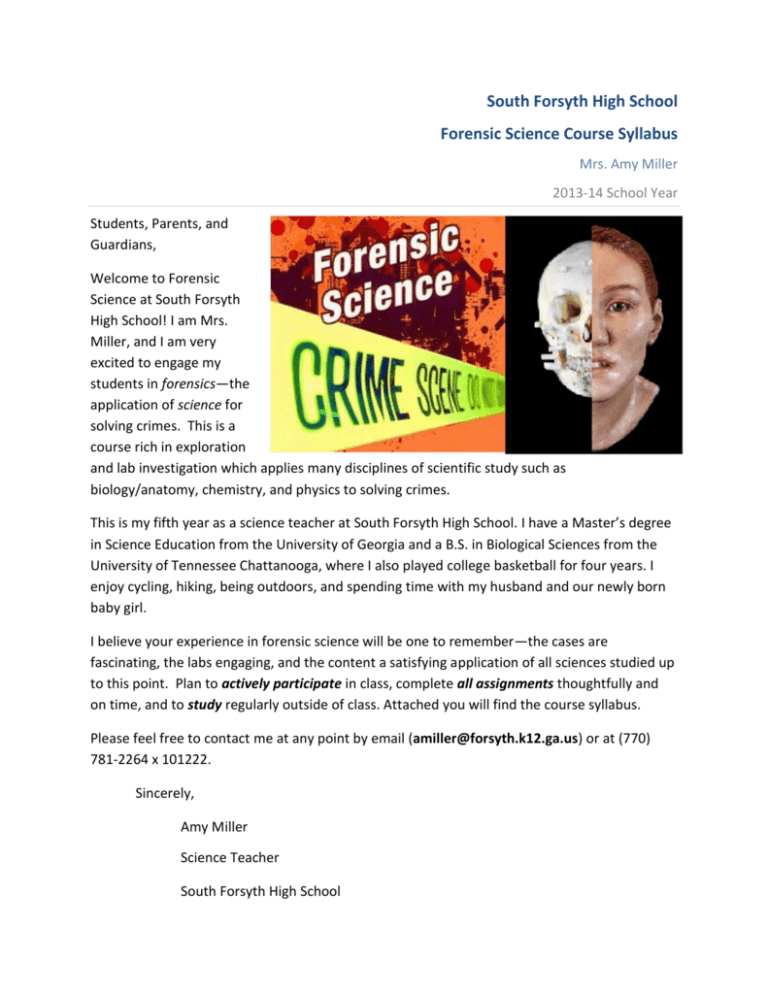
South Forsyth High School Forensic Science Course Syllabus Mrs. Amy Miller 2013-14 School Year Students, Parents, and Guardians, Welcome to Forensic Science at South Forsyth High School! I am Mrs. Miller, and I am very excited to engage my students in forensics—the application of science for solving crimes. This is a course rich in exploration and lab investigation which applies many disciplines of scientific study such as biology/anatomy, chemistry, and physics to solving crimes. This is my fifth year as a science teacher at South Forsyth High School. I have a Master’s degree in Science Education from the University of Georgia and a B.S. in Biological Sciences from the University of Tennessee Chattanooga, where I also played college basketball for four years. I enjoy cycling, hiking, being outdoors, and spending time with my husband and our newly born baby girl. I believe your experience in forensic science will be one to remember—the cases are fascinating, the labs engaging, and the content a satisfying application of all sciences studied up to this point. Plan to actively participate in class, complete all assignments thoughtfully and on time, and to study regularly outside of class. Attached you will find the course syllabus. Please feel free to contact me at any point by email (amiller@forsyth.k12.ga.us) or at (770) 781-2264 x 101222. Sincerely, Amy Miller Science Teacher South Forsyth High School COURSE TITLE: Forensic Science Extra Help Sessions: Mon. & Wed. 7:45-8:15; Instructional Focus; other times by appointment TEACHER NAME: ROOM: Mrs. Amy Miller East Hall 1222 E-MAIL: amiller@forsyth.k12.ga.us PHONE: 770-781-2264 EXT: 101222 File this syllabus for future reference Course Description: Forensic science is a senior-level course rich in exploration and lab investigation which applies many disciplines of scientific study such as biology/anatomy, chemistry, and physics to solving crimes. Georgia Performance Standards: Course standards can be found at www.georgiastandards.org. Units of Study (these should be labeled on binder divider tabs): 1 – Observation, CSI & Lab Techniques 2 – Death: Meaning, Manner, Mechanism, Cause & Time 3 – Forensic Anthropology & Entomology 4 – Trace Evidence (Hair/Fiber; Pollen/Soil; Glass; Casts) 5 – Fingerprints 6 – DNA Fingerprints 7 – Drug ID & Toxicology 8 – Handwriting, Forgery, & Counterfeiting 9 – Arson/Fire Investigation & Explosions 10 – Blood & Blood Spatter 11–Tool Marks & Ballistics 12–Psychological Profiling & Interrogations/ Confessions Learning Resources: for access to virtual flashcards, activities, and glossary reference by chapter: http://school.cengage.com/forensicscience With the emergence of technology as a tool for learning, we will be utilizing various resources to assist with instruction including ITsLearning and other interactive websites. Use the ITsLearning Links list to access resources, assignments, and links to auxiliary content. Keys to Mrs. Miller’s Class: Think. Work. Be involved. Be consistently curious. Connect content to the real world. Check ITsLearning. You will thrive! Required Assignments: There will be approximately 12 units of study, each accompanied by 1-2 summative assessments, primarily consisting of various performance based assessments that require writing, research, well-executed lab protocol, and creativity. The number of formative assignments such as quizzes, homework, learning labs, etc. will be determined along the course of the school year. Students should expect a homework assignment regularly and should look over notes and new material each day. Items needed for class: Pens and pencils, paper, three-ring binder with tabs/dividers, and a composition notebook for labs- thorough notation throughout labs is required Extra Help: Instructional Focus—this is a GREAT time for small group help; ask me for a pass! I am also available Monday and Wednesday mornings from 7:45-8:15. When possible, please make an appointment ahead of time so that I can devote my full attention to your needs. Make-up Work: Make up work is defined as work assigned during a student’s absence, not work assigned prior to an absence. The FCS policy states that a student has 5 consecutive school days upon returning to school to submit make-up work. The instructor may offer additional time in extenuating circumstances. However, be advised that that due to the laboratory intensive nature of the course, some assignments simply cannot be made up; alternative assignments will be required if they are missed. Students should see ITsLearning and then meet with me prior to an absence or immediately upon return for direction regarding missed work. Any paper handouts will be available in our classroom as well. A daily update of everything done in class and access to files used will be posted on ITsLearning. Check it every day! Late Work: Homework must be completed on the day it is due. Long-term projects must be turned in on the previously scheduled date. If a student is absent on that day, he/she must turn in the assignment the day of return to possibly receive full credit. For every day late thereafter, points will be deducted. All other late work will be handled on a case-by-case basis: students must see me in extenuating circumstances. Grading Calculations & Policy: Course Average = 50% (1ST Sem. Course Work) + 50% (2ND Sem. Course Work) 1ST & 2ND Semester Course Work = 75% Summative + 25% Formative (Concept of formative assessment: http://pareonline.net/getvn.asp?v=8&n=9) A = 90 – 100 B = 80 – 89 C = 70 – 79 Failing = Below 70 *Formative Assessments include, but are not limited to homework, class work, some labs, quizzes, rough drafts, and sections of projects/research papers/presentations. *Summative Assessments include, but are not limited to unit tests, final projects, final essays, final research papers, and final presentations, and culminating labs. -Work Habits will also be evaluated every term based on the categories of Responsibility, Participation, Assignment Completion, & Interpersonal Skills Safety & Permissions: Safety and health are basic values in the sciences. Students are required to adhere to: Forensics Safety Rules 1. Use common sense. 2. Know and practice good body mechanics. 3. No work is to be done in the lab without the instructor present 4. Know your lab procedure before performing the lab, including safe handling of materials and equipment. Ask for instructions whenever you are confused. 5. Read the lab thoroughly before you start working on it. 6. Know the location of the safety blanket, the fire extinguisher, the eye wash station, the safety shower and the spill kits. 7. Wear a lab coat/lab apron, safety goggles and close-toed shoes when performing experiments. Tie back loose hair when performing experiments. 8. Always wear gloves when handling microorganisms or potentially hazardous materials. Once you have (or potentially have) had direct contact with these agents, your gloves are considered contaminated. You cannot touch any object that is usually touched without gloves, especially outside your workstation (i.e. faucets, doorknobs, light switches). Clean (potentially) contaminated equipment as soon as the process requiring gloves is finished. 9. Observe all labels on chemical bottles. 10. No food, drink or gum is allowed in this classroom during laboratory experiments. 11. Wash hands before and after working in the laboratory. 12. Sterilize the bench top with the prepared solution before and after a lab. Allow the solution to remain on the bench top for at least 3 minutes. 13. No personal belongings or items not needed for the experiment are allowed in the lab area. Bring designated notebook and pen/pencils to be kept in the lab for the year. 14. Avoid unnecessary activities as excessive movement can lead to contamination of the lab. NO ROUGH PLAY in the lab such as running, hitting, throwing, squirting, unnecessary noise, etc. 15. Never eat, inhale or unnecessarily handle lab agents. 16. Discard all materials as instructed by the teacher. 17. RETURN all equipment to proper locations after use. CLEAN UP your workstation as soon as the experiment is finished and WASH all lab ware as instructed by the teacher. DISPOSE of materials in the properly designated container. DISMISSAL from class occurs after the lab is clean and safe. 18. Make sure hot plates; gas and water lines are turned off when not in use. Double-check and check your neighbors. 19. Students are not allowed in the prep areas (except when accompanied by the teacher to obtain lab components). 20. EVERY lab accident must be reported immediately to the teacher, no matter how small or large. DO NOT endanger yourself or others by waiting or by covering up an accident. 21. If in doubt, ask!!!! The safety contract exists to ensure the safety of everybody participating in the forensic science classroom. In case of violation of safety rules or rules concerning the use of any materials in the Forensic Science program, a safety citation card will be issued. Should a student gather three violation cards, he/she will be disqualified from the Forensic Science classroom unless improved safety behavior is demonstrated and a meeting is held with the student, parent/guardian, curriculum coordinator, and teacher. Permissions Page / Contract: (Please detach from syllabus and return to Mrs. Miller) Student Name: ________________ Period: Date: Student Preferred Email Address for Global Address List: _____________________________________________ I have read, understand and agree to the Forensic Science Safety Contract including the Safety Rules and the Safety Violation Citation System received within the course syllabus. Student’s Signature: ______________________________ Date: _____________________ Date: _____________________ Parent/Guardian’s Name (please print): Parent/Guardian’s Signature: ______________________________ Parental Preferred Contact Information: Email: Phone: Student Initials: Parent Initials: Statement for Consideration: 1. 2. 3. 4. 5. 6. I understand that attendance is a vital component to success in this course and will make every effort to be on time and present in class each day. When I have to be absent from class, I will contact Mrs. Miller by phone or email as soon as possible to arrange for catching up on missed work. I have read and understand the grading policy for Forensic Science. I know that I will have to keep a Laboratory Notebook that will be graded to the same standards as those kept by individuals employed in Forensic Science laboratories. I realize that media literacy is a vital component of this course and that some of the video clips shown/television shows analyzed will involve dramatic representations of criminal acts, crime scenes, and their investigation. In accordance with FCS policy, no R rated clips or movies will be shown at any time. I give permission for my child to watch the clips presented during class. I know that teamwork is vital to not only my success, but to that of my peers. As such, I commit to being a valuable and contributing member of my team. It is permissible to photograph the student referenced in this syllabus during curricular activities for posting on the course website, power-points, etc. The student will not be identified in any way (including his or her name). Cheating in a science classroom can take many forms – passing someone else’s work as your own, fabrication (lying) about results obtained, etc. The integrity policy for this class is that all students submit their own, authentic work. It is more important to determine why your laboratory results are skewed than it is to present results that are “right” (but not what you actually obtained).
